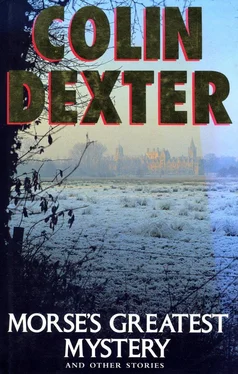Phew!
Morse now intervened between the warring parties: “That’ll be fine, sir. Have no fears! I’ll be interviewing your wife myself. But... but it would help us, sir, if you do happen to know where Mrs. Grainger was on Sunday night?”
“She went to some gala do in London with one of her friends — lady-friends. As I understand it, the pair of them missed the 11:20 from Paddington and had to catch the 12:20 — the ‘milk-float,’ I think they call it — landing up here at about 2 A.M. They got a taxi home from the station. That’s all I know.”
“Have you got this friend’s telephone number?”
“You won’t need it. She lives next door.”
Grainger pointed vaguely to the right; and Morse nodded his unspoken instruction to Lewis.
And Lewis left.
Morse was already seated in the Jaguar when Lewis rejoined him ten minutes later.
“He’s right, sir. They got back here to Cumnor about half-past two in the early hours of Monday morning.”
Morse showed no emotion, for he’d fully expected confirmation of Mrs. Grainger’s alibi.
And he began to explain.
“You see, Lewis, it’s not the who -dunnit aspect of this particular case that’s really important — but the why -dunnit. Why was Sheila Poster murdered? She must surely have posed a threat to someone, either a man or a woman. And more likely a man, I’m thinking. She must have stood in the way of some man’s hopes and calculated advancement. So much of a threat that when she refused to compromise, at some show-down between them, she was murdered precisely for that refusal of hers. So we’d no option but to work backwards — agreed? And we knew her side of things, to some extent, from the story she wrote. Now some things in that story reflected actuality fairly closely, didn’t they? The Graingers’ house — ‘The Grange,’ huh! — her job there — her affair with the husband — her overwhelming wish to force the issue with the wife—”
“Don’t forget the baby, sir!”
“No, I won’t forget the baby. But Grainger didn’t seem to think she was telling the truth about that, did he?”
“She was pregnant, though.”
“Yes, she was telling the truth about being pregnant. In fact, she was telling a whole lot more of the truth perhaps than she was prepared to admit — even to herself. Let’s make a hypothetical case. What, say, if she really wanted to murder not the married couple she was telling herself she hated? What if — in her story — she wanted to murder the very people she did in fact murder: the lady-of-the-house and that lady’s lover ? What if the pair of them had fallen deeply in love? What if — again as in the story — the lady-of-the-house had been only too glad to learn of her husband’s infidelity? Because then she could divorce him, and marry her new lover... the man who stood by the flower-beds and tended the lawns there...”
“The man who came in for a cup of coffee, sir.”
“Perhaps so. But don’t forget she wasn’t just telling us a string of facts in the story — she was making a whole lot of it up as she went along.”
“Really, sir?”
Lewis, as Morse could just about make out in the gloaming, was smiling quietly to himself.
“What the hell’s got into you, Lewis? You antagonize one of our leading witnesses; you go off and find an unshakeable alibi for his missus; and now you sit there grinning like a Cheshire—”
“By the way, sir, they do have a cat — I asked next door. ‘Johnson,’ its name is.”
“You’ve nothing else to tell me, have you?” asked Morse, looking curiously at his sergeant.
“Actually, there is, sir — yes.”
“Out with it, man!”
“Yesterday, sir, when we interviewed Paul Bayley, he said he’d been with his girlfriend all night.”
“You told me that. You told me you’d checked.”
“I did check. Bayley told me she was in the middle of moving flats that very day — seemed she’d been a little bit too generous with her favours for the landlord’s liking; and — just temporarily, mind — she was registered as of no fixed address. But Bayley said she’d almost certainly be in the City Centre Westgate Library — where she went most mornings — in the Local History Section—”
“Where she was!”
Lewis nodded. “Doing some research on Nuneham Courtenay and the Deserted Village. So she told me.”
“Well?”
“Well... that’s about it.”
“Is it?”
“She’s a very beautiful woman, sir.”
“More beautiful than Sheila Poster?”
“I’d say so. More to my taste, anyway.”
“And most men would fancy her?”
“If they had the chance.”
“And Bayley did have the chance.”
“I’m pretty sure he did. He’s been in Jowett Place for about four months or so now. Unemployed for a start; but then in work — so his landlord says.”
“His landlord? When did you see him ?”
“He called in yesterday lunchtime, when you were in the pub. And from what he said—”
“You didn’t mention this before.”
“Thought I’d just do a bit of investigation off my own bat, sir. You didn’t mind?”
“See if you could solve the case, you mean?”
“Try to, yes. And the landlord said it was Sheila Poster who’d told Bayley about the vacancy in the flat upstairs and who’d put in a good word for him, you know — gave him a good-behaviour reference. Not only that, though. I reckon she was the one who told Bayley about the odd-job vacancy going up at the Graingers’ place.”
“Phew!” Morse whistled quietly. “You’re saying Bayley was the odd-job man?”
“I’m saying exactly that, sir!”
“You’re sure of this?”
“Not yet,” replied Lewis, beaming happily.
“Let me get this clear. You’re suggesting that Bayley goes to work for Mrs. Sylvia Grainger — she falls for him — he falls for her — she knows her husband’s having an affair with the charwoman — she’s proof of it. Then” (Morse paused slightly for dramatic effect) “just when things are looking hunky-dory, this charwoman claims she’s pregnant. Not by Grainger, though...”
“... but by Bayley . Yes, sir.”
“And Bayley goes down on Sunday night — has it out with her — she refuses to play ball — and she gets herself murdered. Is that the idea?”
“Exactly!”
“But Bayley’s got an alibi! This local history woman of yours — she says she was with him all night.”
“From about nine P.M. to seven A.M. the following morning. Correct. Slept on the floor together in a friend’s house in Cowley somewhere — she refuses to say exactly where.”
“She’s probably trying to protect her friends or something.”
“Or something,” repeated Lewis.
“Just you bear in mind all the adverse publicity we’re getting about ‘confessions under duress,’ OK? We’ve got to tread carefully, you know that.”
It was still only four o’clock, yet already the afternoon had darkened into early dusk.
“Can you guess, sir, why Dr. Grainger was so worried about me interviewing his wife?”
“He probably thought you were a bit crude, Lewis — preferred a sensitive soul like me. And by the way, don’t forget that there are few in the Force more competent at that sort of thing than me.”
“You can’t think of any other reason?”
“You obviously can.”
Lewis savoured his moment of triumph. “Did you see the wedding-photo just now — the one Dr. Grainger had on the bureau?”
Читать дальше












